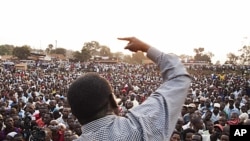Ugandan opposition leaders have re-launched last year’s political protest movement, called Walk to Work, with a series of demonstrations marked by arrests and scuffles with police. The movement hopes to take advantage of the economic discontent sweeping the country.
They are calling it Walk to Work Reloaded: a protest movement against the government of President Yoweri Museveni that picks up where last year’s demonstrations left off.
Once again Kizza Besigye, leader of the opposition party the Forum for Democratic Change, has been holding rallies against corruption, bad governance and the rising cost of living. And once again he and his followers have been harassed, tear gassed and arrested.
Last week, Besigye and a number of other politicians and organizers were briefly arrested ahead of a planned rally.
Police spokesperson Judith Nabakooba told journalists that the police had every right to detain Walk to Work’s leaders. “They were arrested to prevent them from engaging in acts that would lead them to damage property, injury to themselves and others, and also obstruction on the highways. Legally we are mandated to take such an action if we realize that there is a likelihood for breach of peace."
Mary Okurut, Minister of Information and National Guidance, told reporters that the police action was to prevent what she called “mass uprising” and “chaos.”
Several demonstrations have been held in Kampala since and at each one, police have met protesters with tear gas. Besigye claims that this use of force constitutes an abuse of power. “I doubt that there is really any legal remedies, because what they are doing is clearly not backed by any law. It is a clear case of abuse of power, and a blatant violation of the rights of people who have political views that are different from the people in government,” he said.
Walk to Work’s latest push comes on the heels of a series of protests against Uganda’s deteriorating economic situation. These include a traders’ demonstration last November against worsening power cuts, and a four-day strike earlier this month against a steep rise in interest rates.
Besigye claims that these protests indicate a profound discontent with the current government. “The discontent is across the board. What has changed only is that people have become more bold, and are willing to come out and protest against the regime,” Besigye stated.
But political analyst Nicholas Sengoba says that, in fact, most of the recent protests have very little to do with politics. He says although politicians like Besigye would like to capitalize on the current economic malaise, they will find it difficult to do so.
“Many of these protests are actually very selfish, and have narrow interests. For instance, when the traders go on strike, they are mainly concerned about interest rates. They do not expand their cause to include things like corruption, bad governance, restoration of term limits. That is the main reason why in the past, Walk to Work has been starved of that mass appeal,” Sengoba said.
If anything, Sengoba says, Walk to Work is having less of an impact than it had last year, when clashes with police left 10 people dead. He adds that by immobilizing the movement’s leaders, the Ugandan government has actually found a very effective way to prevent it from escalating.
“You can really see the solution that the state has found to clamping down. They simply wake up in the morning and surround the homes of all the party leaders and the people who are organizing Walk to Work, stop them along the way, and that alone breaks up the whole arrangement," noted Sengoba. "So it really puts them in a very weak position.”
With so many Ugandans struggling just to feed their families, Sengoba says, it is difficult these days to summon sustained support for a political cause. He adds that Walk to Work has lost its novelty value for Ugandans, and without police intervention and the headlines it generates, the movement might simply burn itself out.
“If these people walk, two things might happen: one, they might be joined by people. But secondly, they might also be ignored by people who feel less concerned about the matters that the opposition is trying to put across. For how many days are people willing to keep following politicians and listening to them talking about bad governance, term limits, corruption? The state has a very good opportunity of crushing Walk to Work by simply allowing it to go ahead,” Sengoba said.
Police say they will continue to crack down on demonstrators whom, they say, are acting illegally. Walk to Work organizers are planning another rally on Saturday.
Uganda Opposition Hopes to Capitalize on Economic Discontent




